Party building has never been just about strengthening the organization or perfecting personnel. It is a process of continuous self-renewal of a ruling Party - to constantly stand firm in the face of challenges, maintain the trust of the People and its own political mettle. From President Ho Chi Minh's Testament, the core ideology has been positioned: "Our Party is ethical and civilized." That simple saying, after more than half a century, is still the standard that illuminates the Party's journey of self-improvement in the new era - an era in which all values of power must be proven by effectiveness and legitimacy before the People.
On that basis, the XIII Congress Documents identified building and rectifying the Party and a clean and strong political system as the "key of the key" task. Continuing that spirit, Resolution No. 66-NQ/TW (April 30, 2025) of the Politburo on innovation in law-making and enforcement, and Resolution No. 68-NQ/TW (May 4, 2025) of the Politburo on private economic development have opened a comprehensive innovation axis - from institutional thinking to action capacity. This is not only a directive document, but also a strategic "pivot", helping the Party shift from a management mindset to a service mindset, from command to creation. The work of disseminating and implementing Resolutions 66 and 68 is organized nationwide; the national online conference in May 2025 clearly outlined the content and implementation roadmap; Many agencies and units have joined in large-scale learning, such as the EVN Party Committee, which has over 1,700 cadres and party members participating. These signals show the effort to shift from policy to synchronous action throughout the system.
But Party building cannot stop at propaganda. The core issue is to turn policies into standards, and resolutions into concrete governing capacity. As of August 14, 2024, 141 cadres under the Central Committee's management were disciplined (of which 31 were members and former members of the Central Committee); in 2024 alone, the entire system disciplined more than 700 Party organizations and about 24,000 Party members, of which 68 cadres under the Central Committee were disciplined. These numbers are not to show off discipline, but to prove that Party building is not only "consolidating the ranks", but also to purify power, affirm the strictness of the organization and the mettle of the leader.
Behind each disciplinary decision is a consistent message: the Party does not tolerate mistakes, does not shirk responsibility, and is not afraid to look directly at itself. Along with that, the process of innovation in leadership methods is placed at the center of governing capacity. If in the past, the leadership role was mainly expressed through administrative direction, now the Party has strongly shifted to leadership through institutions, through example, and through public service ethics standards. Resolution 66 is a vivid expression of that thinking: there cannot be a strong Party if the law is weak; there cannot be rule of law if power does not illuminate itself through responsibility. That thinking makes "Party building" no longer the sole responsibility of Party committees, but the responsibility of the entire political system - from legislative, executive to judicial.
In the context of increasingly modernized people's supervision mechanisms, technology and media, the requirement for the Party is not only "correctness", but also "transparency". Today's leadership strength does not come from distance, but from the ability to persuade, be close to the people and publicly disclose responsibility. Therefore, along with the issuance of major resolutions, many Party committees have promoted digital transformation in Party work: building electronic Party member databases, digitizing inspection and supervision records, deploying "electronic Party member handbooks"... so that every process has specific traces and responsibilities. These steps not only reduce procedures, but also create a "culture of transparency" in the operation of power.
All these efforts are shaping a new phase of Party building – a phase in which “legitimacy” becomes the soft power of power, and “people’s trust” is the truest indicator of governing capacity. A Party that knows how to listen to the people, knows how to reflect on itself and dares to take responsibility before the people is a Party that will never lose its revolutionary character. Party building is therefore not about making the apparatus bigger, but about making the people in the apparatus kinder, more upright and closer to the people. That is the real foundation for a strong Party, people’s trust and a lasting country.
Colonel - Journalist Nguyen Hoa Van, former Deputy Chief of Political Department of the Border Guard, shared: "The 14th Congress is not only about consolidating the organization, but also about strategic breakthroughs and governing culture. It is a journey of telling the truth, doing the truth, saying less and doing more; a journey of valuing talents and resolving paradoxes on the path of development. When that culture permeates every level and every sector, it will follow the beat of millions of patriotic Vietnamese hearts."
If Party building is to build a foundation, then Party rectification is to maintain the foundation. The two are not separate but reflect each other as two aspects of the governing spirit. Because only a Party that dares to reflect, correct, and purify itself can survive the changes of the times.
Since the 13th National Congress, Party rectification work has been carried out with unprecedented scope and depth. The series of Central Resolutions 4 (terms XI, XII, XIII) on Party building and rectification has become the "backbone" for the process of self-purification of the ranks. Conclusion No. 21-KL/TW (October 25, 2021) of the 13th Central Executive Committee affirmed: "Strengthening Party building and rectification and the political system; resolutely preventing, repelling, and strictly handling degraded cadres..." It is no coincidence that the keyword "self-reflection - self-correction" has become a consistent command in Party cell activities.
Regarding disciplinary action against cadres under the Central Committee's management: as of August 14, 2024, 141 cadres under the Central Committee's management had been disciplined, of which 31 were members and former members of the Central Committee; in 2024 alone, the entire system disciplined more than 700 Party organizations and about 24,000 Party members, of which 68 cadres under the Central Committee were disciplined. These figures demonstrate the strictness and consistency of the rectification work.
Regarding the recovery of corrupt and economic assets: in 2024, civil enforcement agencies recovered over VND 22,000 billion in corruption and economic cases; entering 2025, the figures continued to increase according to periodic reports. The latest statistics (in the last 10 months) show that nearly 3,600 cases with over VND 22,342 billion have been executed for corruption and economic cases. These indicators reflect substantial efforts with results.
The above results are not only the product of anti-corruption efforts, but also a measure of the determination to rectify from the root – where political ethics return to be the standard of power. At recent inspection forums, the guiding spirit was emphasized: the Party's inspection, supervision and discipline work must be strict, comprehensive, resolute and effective – considering this as the fulcrum to strengthen discipline within the Party.
However, as Colonel - Journalist Nguyen Hoa Van, former Deputy Chief of Political Affairs of the Border Guard, shared: "What needs to be a breakthrough in rectification now is not only to handle violations, but also to destroy the privileges of interest groups and fight against "running", especially in personnel work. When there is no longer privilege, discipline will have real meaning; when "running" is fought, public service culture will truly become a culture of power."
According to Colonel Nguyen Hoa Van, if we only stop at handling violations, the rectification work will not be sustainable. The root of rectification, in the end, is to restore political culture in the Party - where power is illuminated by morality, and honor becomes the measure of prestige.
Therefore, Regulation No. 144-QD/TW (May 9, 2024) of the Politburo on revolutionary ethical standards of cadres and party members was issued, emphasizing the role of leaders in setting an example, requiring "words to go with actions", practicing integrity, self-criticism and criticism. This is an ethical standard to prevent and combat degradation right from the "core" of power.
When rectification goes hand in hand with democracy and transparency, discipline is protected by the people, and trust is nurtured by public accountability. Practice shows that many localities have promoted dialogue mechanisms, social supervision, and reformed the apparatus to bring the government closer to the people (such as the two-level government reform program, increased public reception and dialogue - the Government has recognized the initial results).
Party rectification, in the end, is a moral journey - not to judge, but to preserve the core values of power. If building is to build capacity, then rectification is to preserve dignity. A Party that knows shame when it makes mistakes, dares to admit mistakes, dares to take responsibility, dares to "purify itself to become stronger" - that is the greatest political courage.
In the process of preparing for the 14th Congress, when the entire Party examines itself through reports, reviews, and personnel procedures, the profound meaning of rectification does not lie in "how many cases are handled", but in the fact that each leader and each Party member understands why they must live with integrity, why they must admonish themselves. Because political power does not exist by orders, but by trust; and only when that trust is preserved by the purity of the organization, by the morality of those in power, by respect for the People - can rectification work fulfill its greatest mission: to make the Party stronger by being more transparent.
If Party building is the root and rectification is the body, then innovation in leadership methods is the "circulation" that brings vitality to the entire political body. A strong ruling Party cannot stand outside the times – and even less can it lead with the methods of the past. In the context of global digital transformation, when technology is reshaping the economy, society and political behavior, innovation in leadership methods has become a vital requirement for the Party.
Right from the beginning of the 13th term, the Politburo issued Resolution No. 57-NQ/TW (December 22, 2024) on scientific and technological breakthroughs, innovation and national digital transformation, laying the ideological foundation for modernizing leadership methods throughout the system. On that basis, the Government issued Resolution No. 71/NQ-CP and Resolution No. 214/NQ-CP (July 23, 2025) to specify the connection, sharing and creation of national data, forming a data-based operating infrastructure - the foundation for a creative, transparent and serving Government.
Within the Party, the Secretariat issued Regulation No. 339-QD/TW (July 10, 2025) on the Electronic Party Member Handbook, standardizing activities, managing records, digitizing minutes, creating the habit of "leaving digital traces" - thereby increasing traceability, transparency and accountability in all processes. This shift in thinking is fundamental: from "leading by directives" to leading by institutions and data, from manual control to control by technology, from closed processes to open and traceable processes.
Colonel - Journalist Nguyen Hoa Van said that the Party's leadership method is based on two pillars: leadership by platform, guidelines, and resolutions institutionalized by law; and through a team of elite party members holding key positions in the state apparatus and the entire political system. However, when a part of cadres and party members degrades and is dominated by group interests, when "buying positions and power" and "legitimizing democracy" are widespread, that mechanism is out of sync. When power is no longer linked to ethics and responsibility, the leadership method is easily distorted, creating "illegitimate power" - something that erodes people's trust and distorts the ruling nature of the Party.
According to Colonel Nguyen Hoa Van, the urgent task now is to operate the Party's leadership method in a transparent manner, eliminate "democratic legitimation", eliminate "illegitimate power", to purify the team, attract and make use of talents. Transparency is not only a technical requirement, but also a political quality of those in power. And in the digital age, technology is the most powerful means to ensure that transparency.
In fact, the digitalization of Party and cadre work not only reduces administrative procedures but also creates an "ecosystem of responsibility", where every decision has a trace and every power can be monitored. Digital transformation in Party building work is a way to practice the principle of democratic centralism in a concrete and transparent way - where Party members, inspection agencies, and even the people can monitor and evaluate objectively. "The digital environment," as Colonel Nguyen Hoa Van said, "is a place to train the qualities, mettle, and capacity of cadres; it is also a place where Party organizations discover talents and shortcomings in the operation of power."
Thanks to technology, the stages that are prone to negative consequences in personnel work – such as evaluation, planning, and appointment – are gradually transferred to a data platform, with control and traceability. When data becomes a "silent supervisor", public ethics are illuminated by practice; and when officials know that every action leaves a trace, a culture of responsibility gradually takes shape.
According to the E-Government Development Index (EGDI) published in September 2024, Vietnam ranked 71/193 countries, continuing to improve compared to 2022 - an objective indicator that data-driven leadership is gradually becoming a reality. But innovation in leadership methods does not stop at "electronicizing processes". It is also about innovating the way trust operates: when technology makes everything visible, the leader's reputation no longer comes from power, but from transparency and accountability to the people.
Digital transformation is therefore not just a technical reform, but a revolution in the culture of power - where openness replaces secrecy, accountability replaces evasion, and digital ethics becomes a permanent mirror for those in power. It is also the new immune system of the organization, helping the Party purify itself through transparency; at the same time, restoring people's trust on the basis of objective and honest data.
Innovating leadership methods in the digital age, in the end, is about building knowledge management capacity and a culture of transparency in governance. A strong Party is one that knows how to turn knowledge into soft power, data into trust, and technology into a tool to serve democracy. And that is also the mettle of a modern ruling Party – leading not only by power, but also by intelligence and public service ethics illuminated in the digital space.
Party culture and people's trust are the soul of power. The strength of a ruling Party comes not only from its institutions, organization or discipline, but from the culture of those in power themselves. That culture — if nurtured with honesty, integrity and a spirit of service — will become a "soft armor" that protects power from corruption.
Without culture, power is just a tool; with culture, power becomes responsibility. When that responsibility is put into action, it turns into trust — the most precious political asset a Party can possess.
President Ho Chi Minh once advised: "If you want to guide the people, you must set an example for them to follow." This seemingly simple saying is the foundation of the Party's cultural philosophy. Here, the example of a Party member is not only personal morality, but also a manifestation of organizational prestige. After more than 90 years, this teaching remains relevant - especially in the context of social trust increasingly tied to the specific behavior of leaders.
Regulation No. 144-QD/TW dated May 9, 2024 of the Central Executive Committee on the responsibility to set an example has become a guideline for the Party's political culture. The regulation requires: leaders to be exemplary in ethics, lifestyle, and behavior; resolutely fight against individualism; and words must go hand in hand with actions.
According to the Report of the Central Propaganda and Mass Mobilization Commission (June 2025), the movement to study and follow Ho Chi Minh's ideology, morality and style has spread strongly, with tens of thousands of effective models and practices registered. In many provinces such as Dong Thap, there have been more than 1,300 models in the movement. Some localities have also experimented with models such as "Party members set an example - people verify", "Government dialogue - listen to people speak"; these models are ways to turn the gap between the Party and the people into regular practice. The trend of expanding young creative models in the movement has clearly appeared.
At the 2024 conference summarizing mass mobilization work, the then Head of the Central Mass Mobilization Commission, Ms. Bui Thi Minh Hoai, said: "There is no mass mobilization work better than the example of cadres." That statement is a concise definition of "power culture": cadres do not need to say much, just need to live correctly.
Party culture is a system of values that shapes the way the Party dialogues with society. During war, that culture is sacrifice and trust; during peacetime development, it is responsibility, transparency and integrity. Associate Professor Dr. Nguyen Thi Tho, lecturer at the Faculty of Philosophy - Hanoi National University of Education, explained: "Party culture is the highest form of political consciousness of a ruling Party. It lies not only in words, but also in the behavior of the organization and individual Party members. When that culture is nurtured by ethics and reinforced by trust, power does not need to be imposed but is still voluntarily acknowledged by the people."
Associate Professor Dr. Nguyen Thi Tho further emphasized: "The Party retains the people's trust not because it speaks well, but because it lives up to what it says. Party culture, in the deepest sense, is the unity between words and actions - between public values and common interests."
It is this culture that helps the Party maintain its prestige even when faced with mistakes - the people can accept shortcomings but not lies. A public disciplinary decision or an apology from a leader can sometimes be more valuable in strengthening trust than hundreds of propaganda articles.
Since 2021, setting an example and practicing public ethics has been included in the criteria for evaluating and appointing officials. According to the Party's inspection and supervision work report in recent years, thousands of Party members who violated ethics and lifestyle have been disciplined, and many exemplary individuals and groups have been commended as "learning from Uncle Ho from small things". Changing awareness - that ethics is not only an internal factor but also a standard for exercising power - is truly worthy of respect.
Power without culture is easily corrupted; culture cannot be imposed but must be spread by example. When people see officials apologize, take responsibility, and listen, they not only sympathize but are also willing to protect. Conversely, when officials say one thing and do another, political culture collapses in the hearts of the people before discipline is issued.
Restoring Party culture is a strategic task to strengthen national political trust. In a world where information spreads faster than reason, trust is easily lost but is also the greatest resource for the country to move forward. A strong Party is a Party that knows how to "defend itself with culture" - using beauty, truth and kindness to fight against degradation. At that time, Party culture is not only a tool to protect power, but also a fire that keeps power warm, bright and close to the people.
Remember what President Ho Chi Minh once advised: "We must always remember and practice the saying: For the benefit of the country , forget the benefit of the family; for the common benefit, forget personal benefit. We must be worthy of our compatriots, worthy of the Fatherland . " From a certain perspective, this also contains a lot of Party culture.
And today's Party culture, in its deepest sense, is the inheritance of that spirit - of those who consider honor greater than position, responsibility greater than rights, and the people's heart as the root of power. When that spirit is preserved and spread, the people's trust will never be exhausted.
Each Party Congress is a historical milestone, but the 14th Congress has a special significance: it is the Congress that opens a pivotal period - moving the country from rapid development to sustainable development, from growth by resources to growth by innovation, from building mechanisms to cultivating trust. Not only summarizing the term, the 14th Congress is also a new commitment of the Party to the nation: "Building and rectifying a strong Party - maintaining the people's trust - arousing the aspiration to develop a prosperous and happy country."
Speaking at the Government Party Congress on October 13, 2025, General Secretary To Lam said: "Building a team of cadres and civil servants who are "talented, visionary, and dedicated"; have strong political will, pure ethics, high responsibility, dare to think, dare to do, dare to take responsibility, dare to face difficulties and challenges; shift from "administrative thinking to service thinking"; shift from "fulfilling responsibility" to "doing things thoroughly"..."
That brief speech, in the moment of preparing for the National Congress, was not only a political call, but also a declaration of belief: the Party's strength does not lie in slogans, but in the ability to turn the people's belief into energy for national development.
Since the 13th National Congress, Vietnam has experienced many great challenges: pandemics, global economic fluctuations, extreme natural disasters and a number of pressing incidents in the public sector. But it was during this period that the Party's leadership was tested and affirmed. The work of preventing and combating corruption and negativity was maintained at a high intensity; the streamlining of the apparatus, administrative reform, digital transformation, private economic development and strategic infrastructure investment - all created a new face for the country.
According to the Government's assessment in the term summary report, the average growth rate in the 2021-2025 period is estimated at about 6.3%/year - one of the highest in the region. Import-export turnover is forecast at hundreds of billions of USD , newly attracted FDI capital is tens of billions of USD, the multidimensional poverty rate has decreased sharply; according to PAPI 2024 , people assess that the effectiveness of governance and public administration in the locality has clearly improved. Those numbers - although still in estimates - reflect more than economic factors: it is a sign of political stability , reinforced by people's trust.
However, what the 14th Congress aims for is not just achievements but a longer-term vision. That is, to turn Vietnam into a developed, high-income country by 2045. That goal requires comprehensive innovation – not only in terms of institutions, but also in terms of governance thinking, political qualities and leadership culture. In other words, the 14th Congress will not only "set new goals", but also "reset the value system" for the entire Party. Politics must go hand in hand with ethics. Power must go hand in hand with responsibility. Development must be synonymous with fairness and humanity.
Lieutenant Colonel Nguyen Van Do, a 60-year Party member in Phuc Trach commune (Ha Tinh), shared in a conversation with reporters: "I have been through two wars and witnessed many Congresses, but I have never felt as clearly as now that: The Party is strong when the people are at peace. People believe not because they are promised many things, but because they see what has been done. People in my hometown only hope that cadres know how to love the people, know how to live honestly, and know how to keep their word. Just that alone means the Party is in the hearts of the people."
Mr. Do's words are simple, but like a slice of life, faith does not lie in documents, but in the behavior and ethics of each person in power.
These days, when grassroots Party organizations have been and are holding congresses, the atmosphere of preparation for the 14th Congress is spreading everywhere. There, each review, each draft document, each personnel plan is not just a procedure, but a self-examination. Party committees, Party committees, branches, and localities are simultaneously reviewing cadre standards, placing political, ethical, capacity, and vision requirements at the forefront - not only to select people, but to select beliefs. Because people are the center of all policies, and beliefs are the center of all power.
Looking back over forty years of Doi Moi, it can be seen that every time the Party innovates, the country steps up a new level. The 6th Congress paved the way for innovation; the 10th Congress promoted integration; the 13th Congress shaped the 2045 vision; and this 14th Congress will be a Congress of political trust and cultural development. A trust that is not created by propaganda, but built by action - by transparency in governance, integrity in leadership and closeness in dealing with the people.
To maintain that belief, we cannot rely only on achievements, but must rely on morality. We cannot just talk about the desire for development, but must prove that such development makes people's lives better, fairer, and safer. We cannot just talk about Party rectification, but must let the people feel that the Party is truly renewing itself for the people, not for itself. That is the highest standard - and also the biggest challenge of the 14th Congress.
Because in every era, political power is only meaningful when it is given by the people, and trust only exists when the rulers fear the people, listen to the people, and work for the people. The 14th Congress, therefore, is not only a meeting of delegates, but also a dialogue between the Party and the People about the future - a future in which democracy within the Party leads to democracy in society, rectification within the Party spreads to integrity in the government, and aspirations within the Party become aspirations of the entire nation.
If construction and rectification are the two pillars, then trust is the roof of the political house. Trust cannot be bought or borrowed, it can only be maintained through good deeds. When the Party maintains that trust, even when the world changes, the people's hearts will still turn toward one thing; and when the people's hearts remain, the country will never lose direction.
Perhaps, that is also the deepest meaning of the 14th Congress: A Party that knows how to reflect on itself is a Party that never goes astray. A Party that is trusted by the people is a Party that never fails. The 14th Congress is where the Party renews itself to continue the journey of defending and building the country and maintaining the people's trust.
Source: https://vtv.vn/dai-hoi-xiv-xay-dung-chinh-don-dang-vung-manh-giu-vung-niem-tin-nhan-dan-100251027120842905.htm



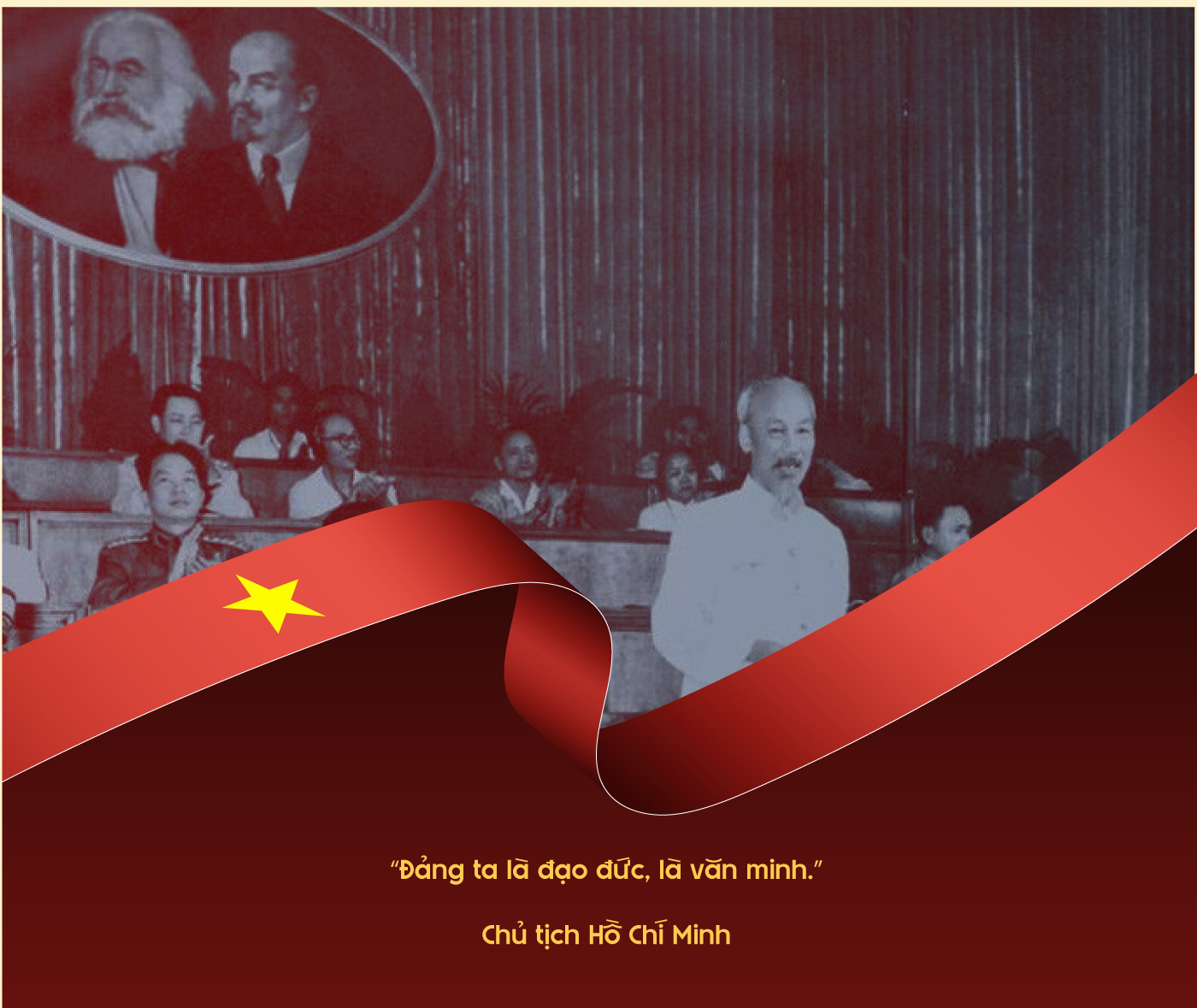
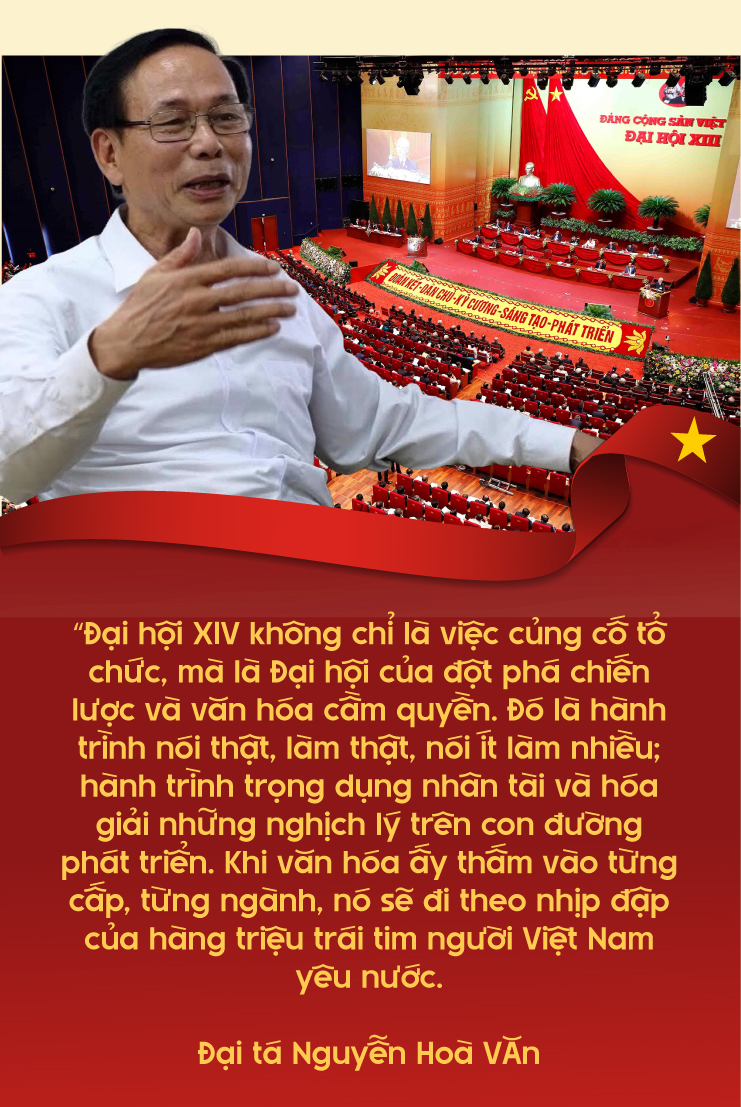

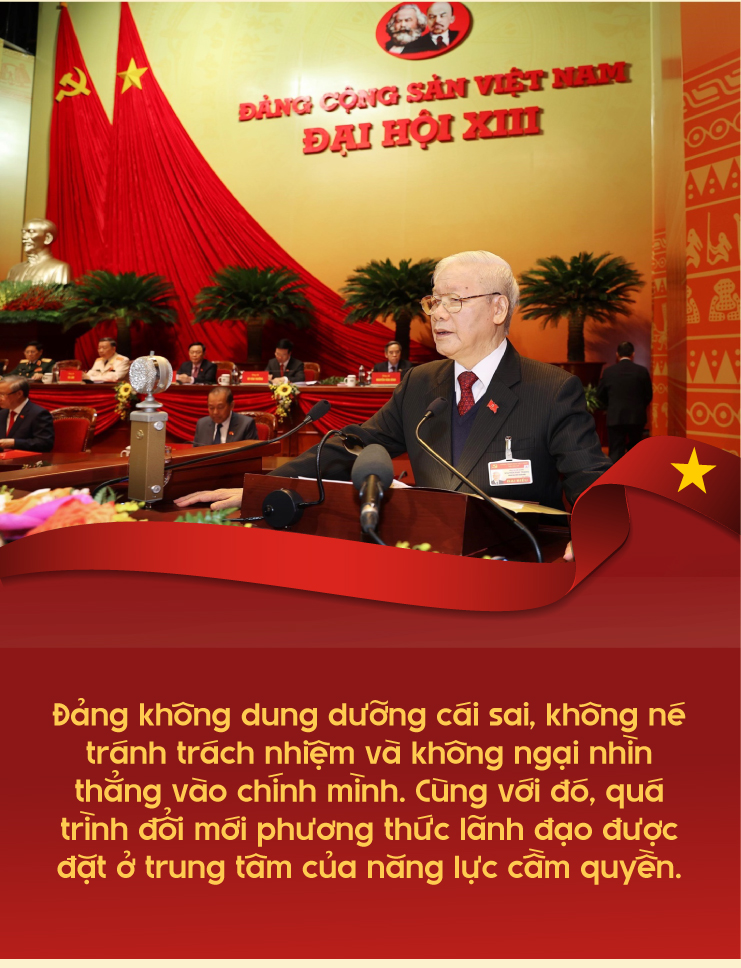
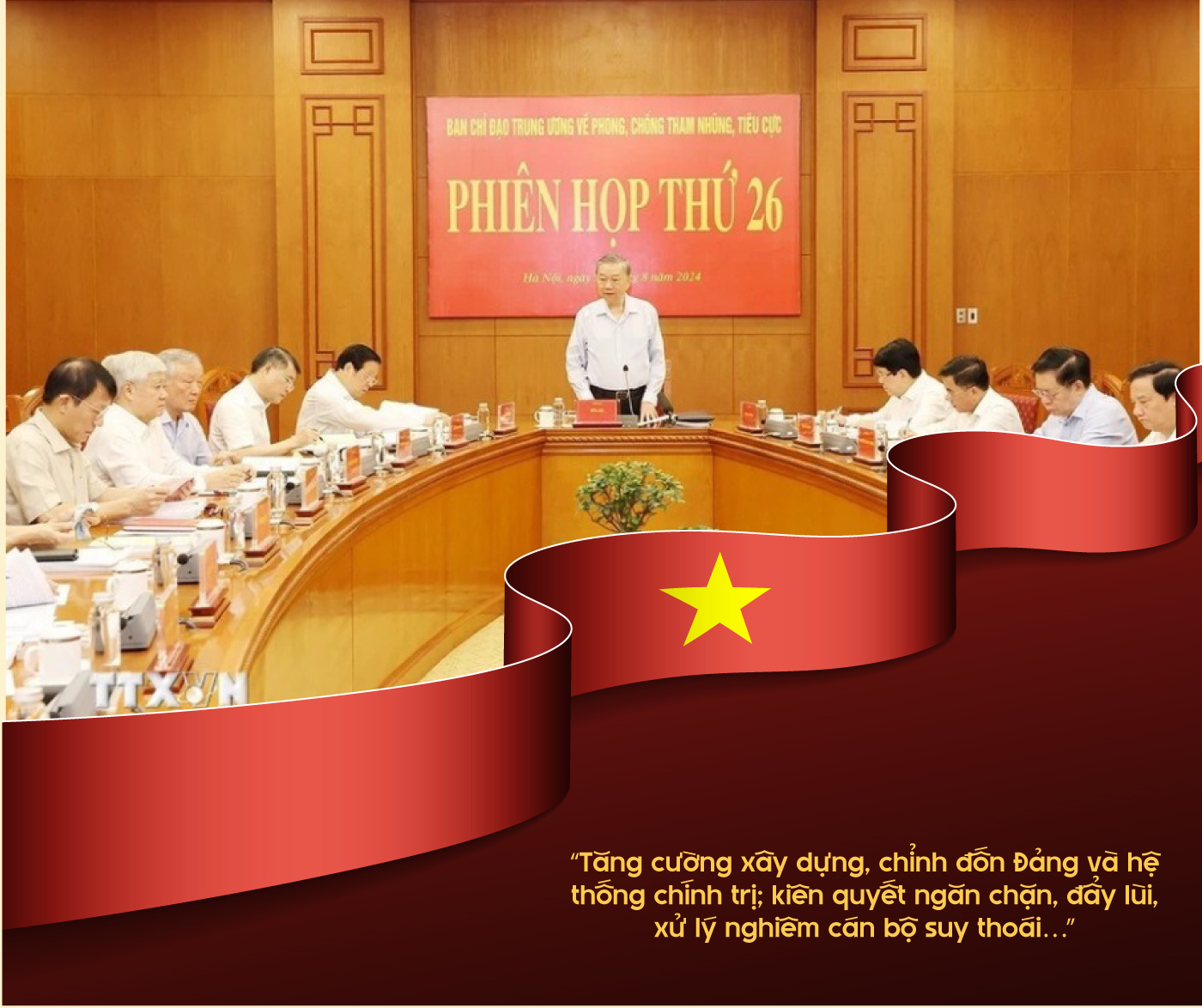

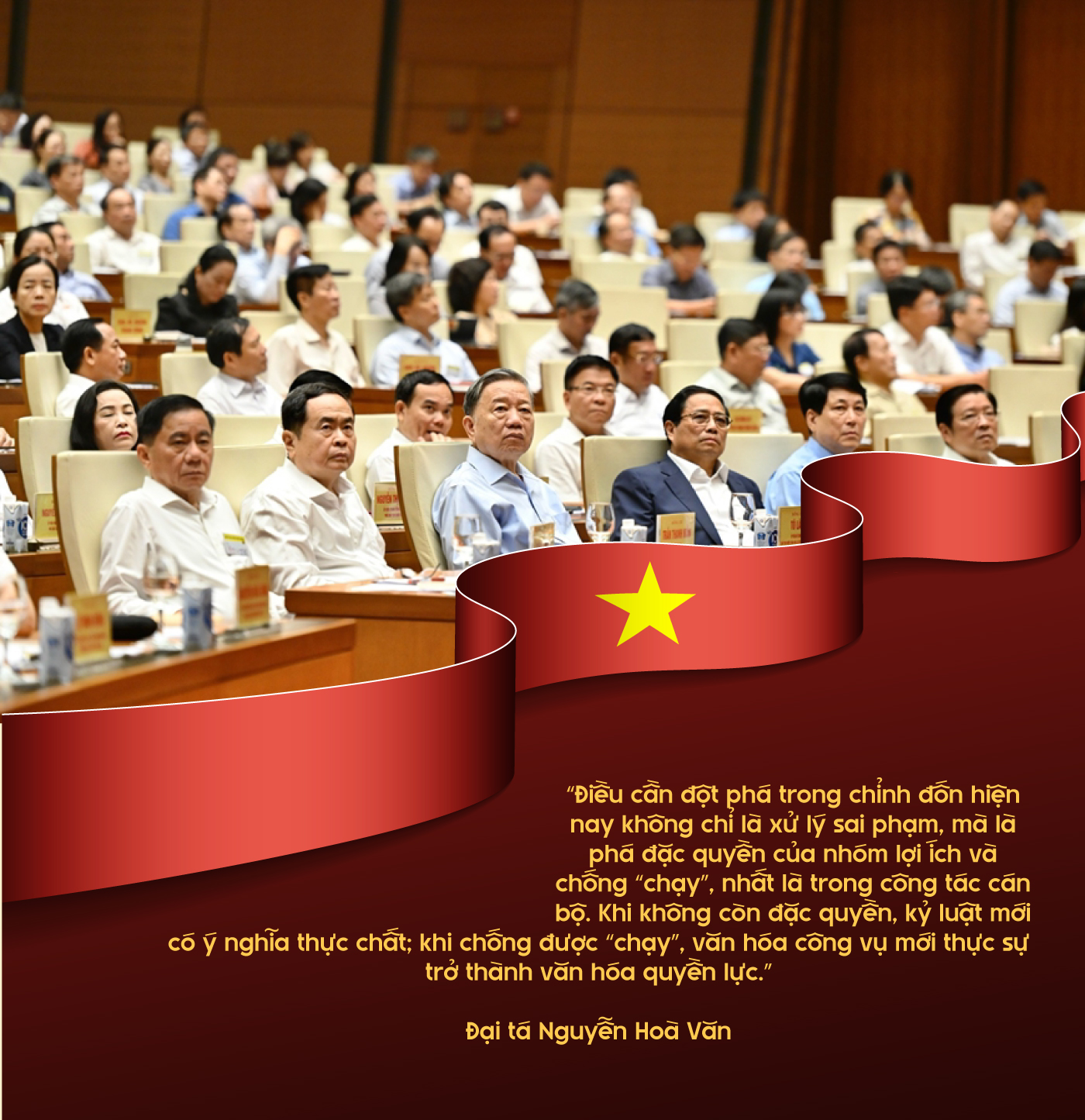
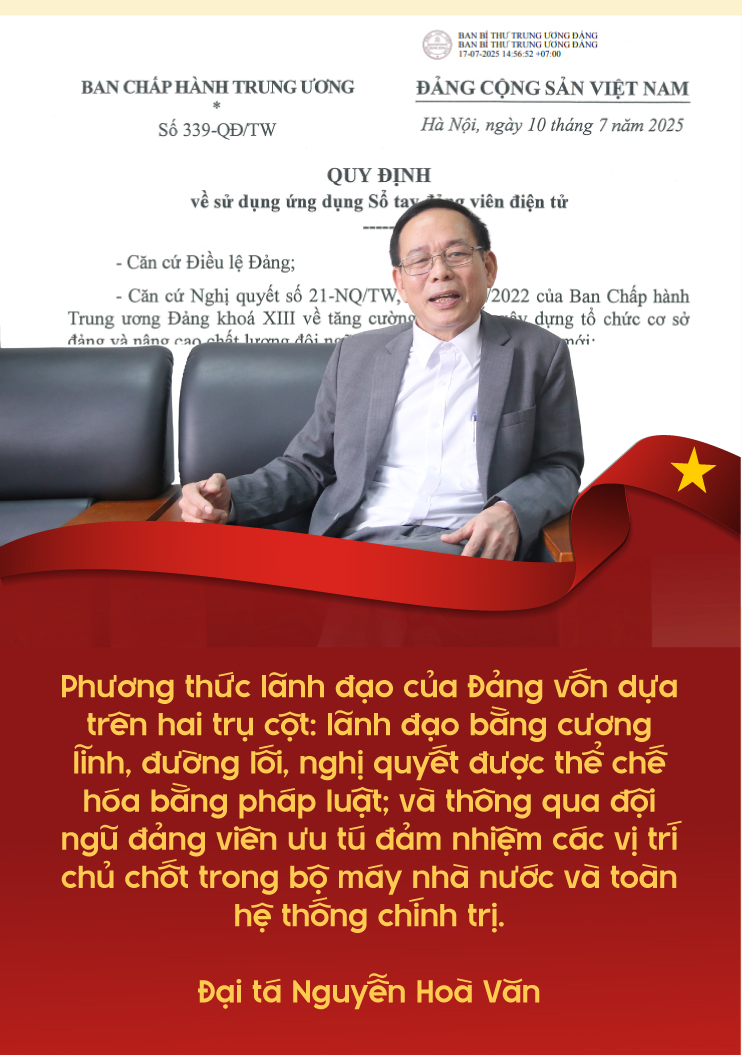
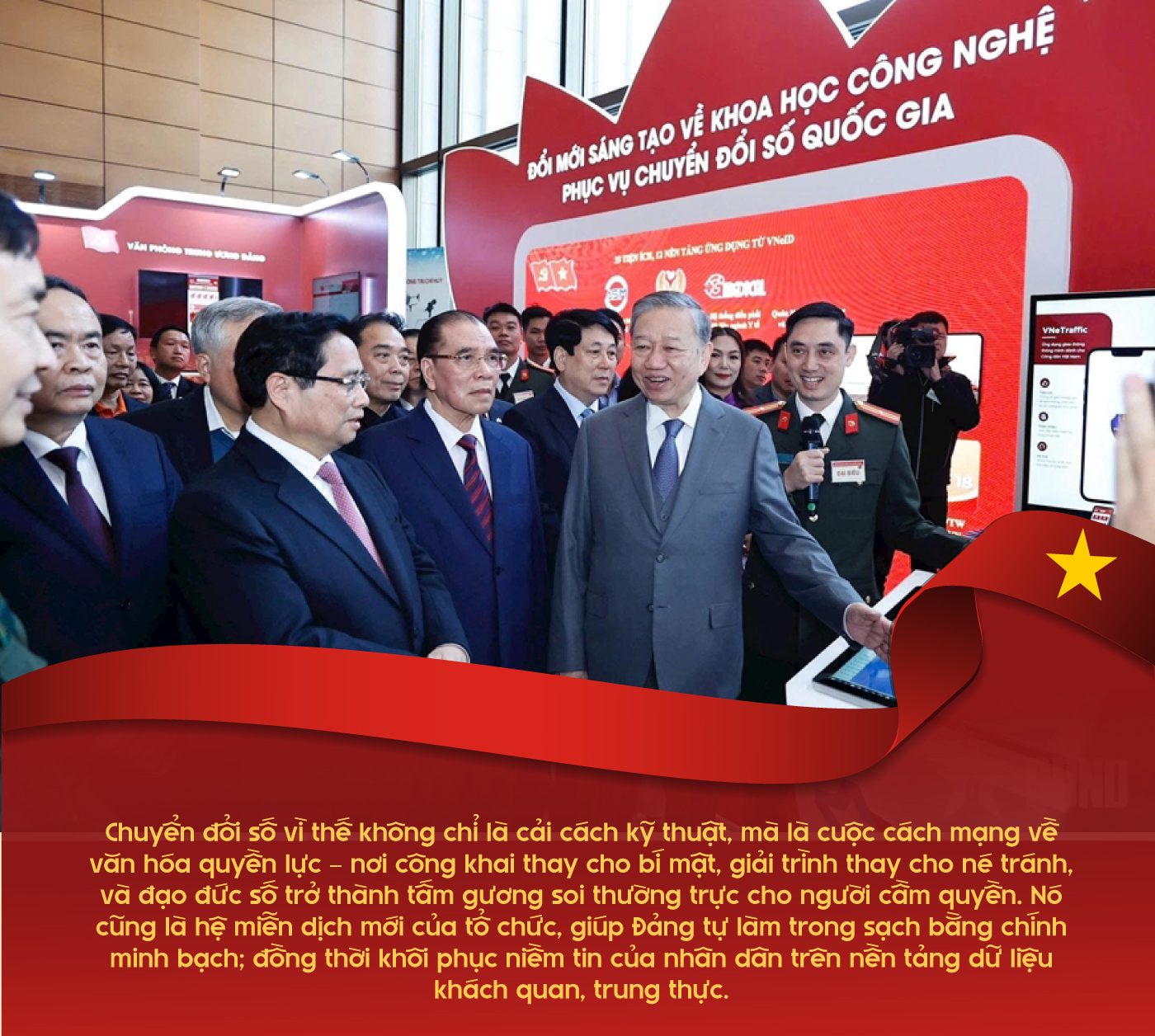

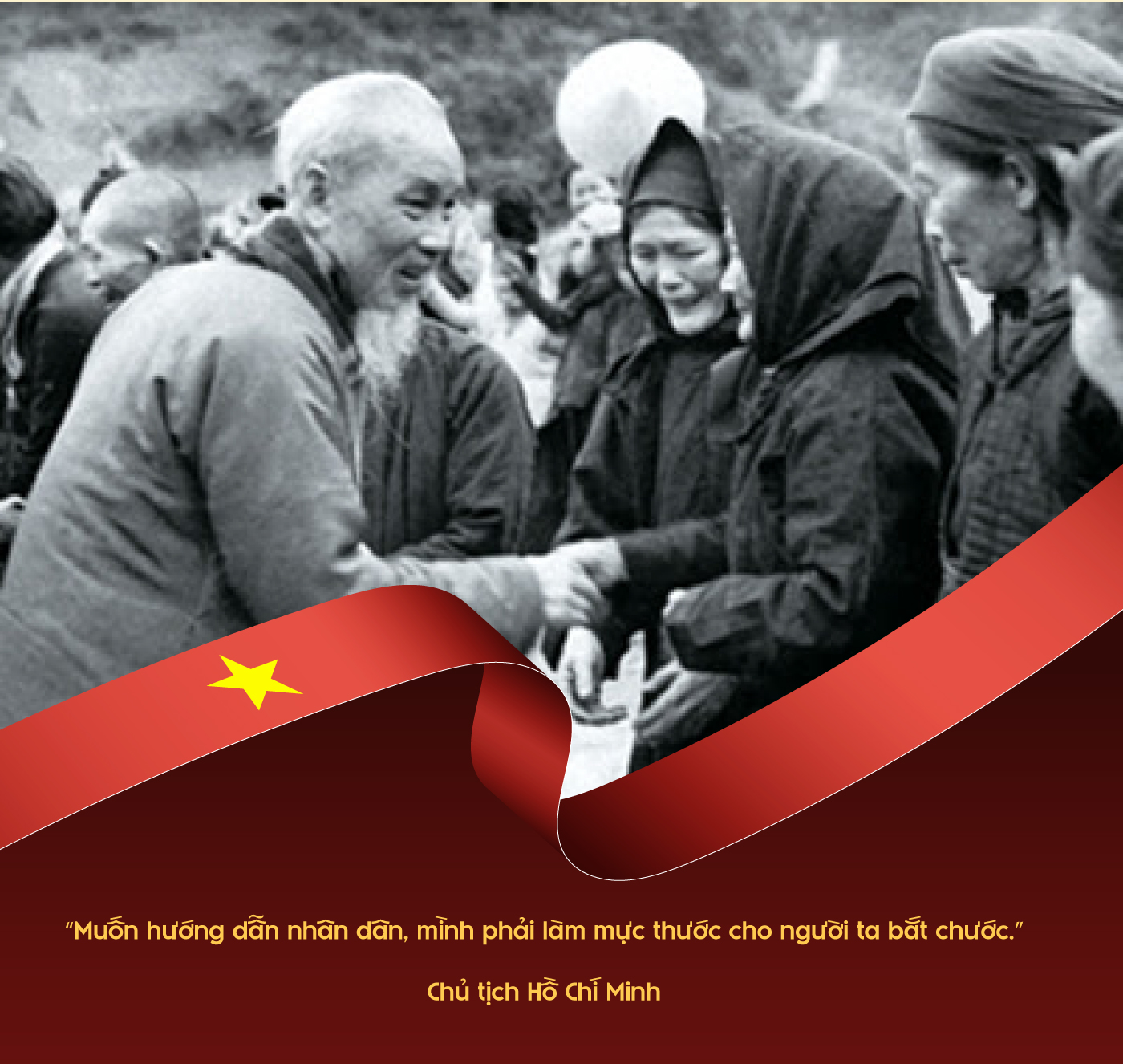
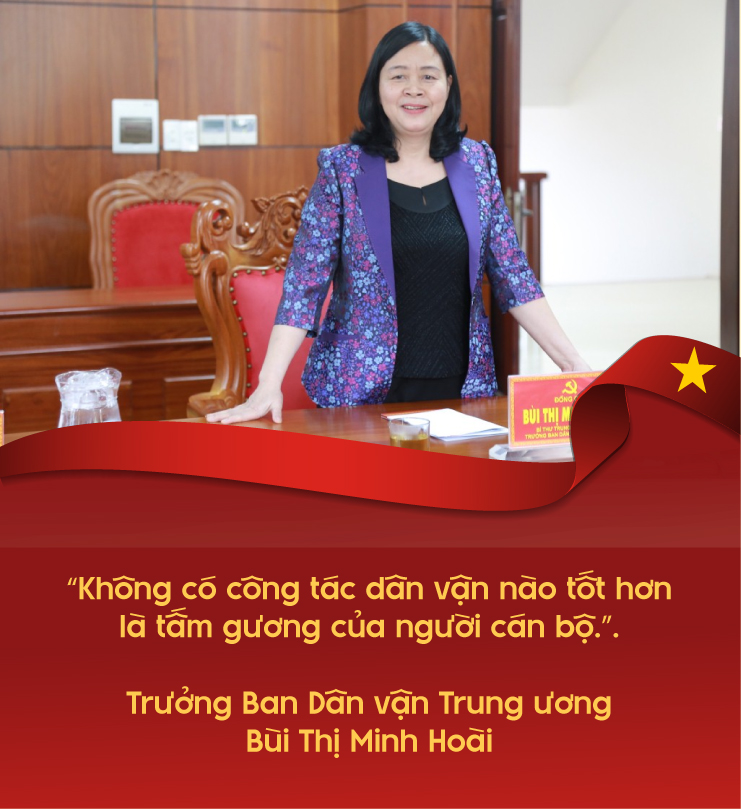
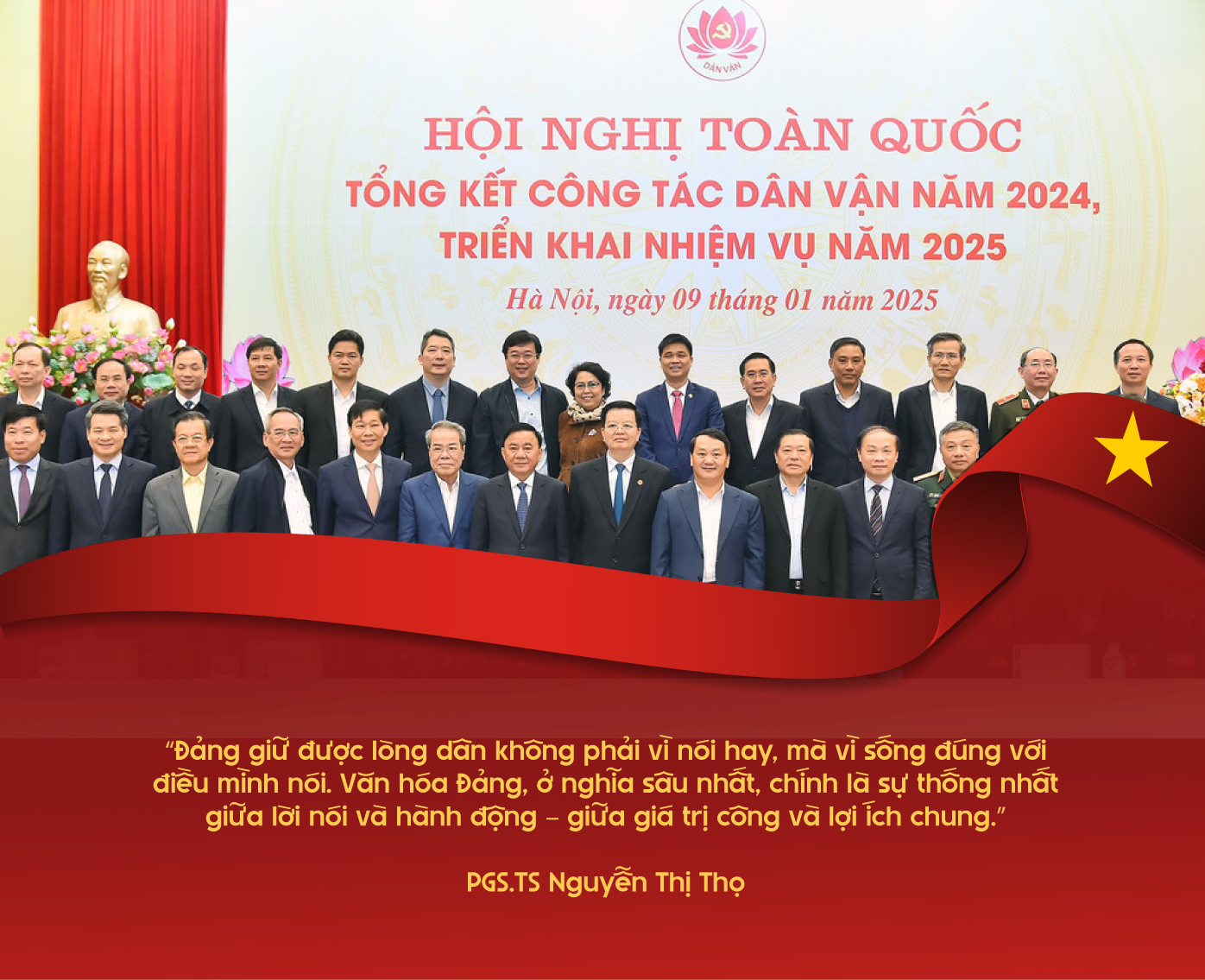


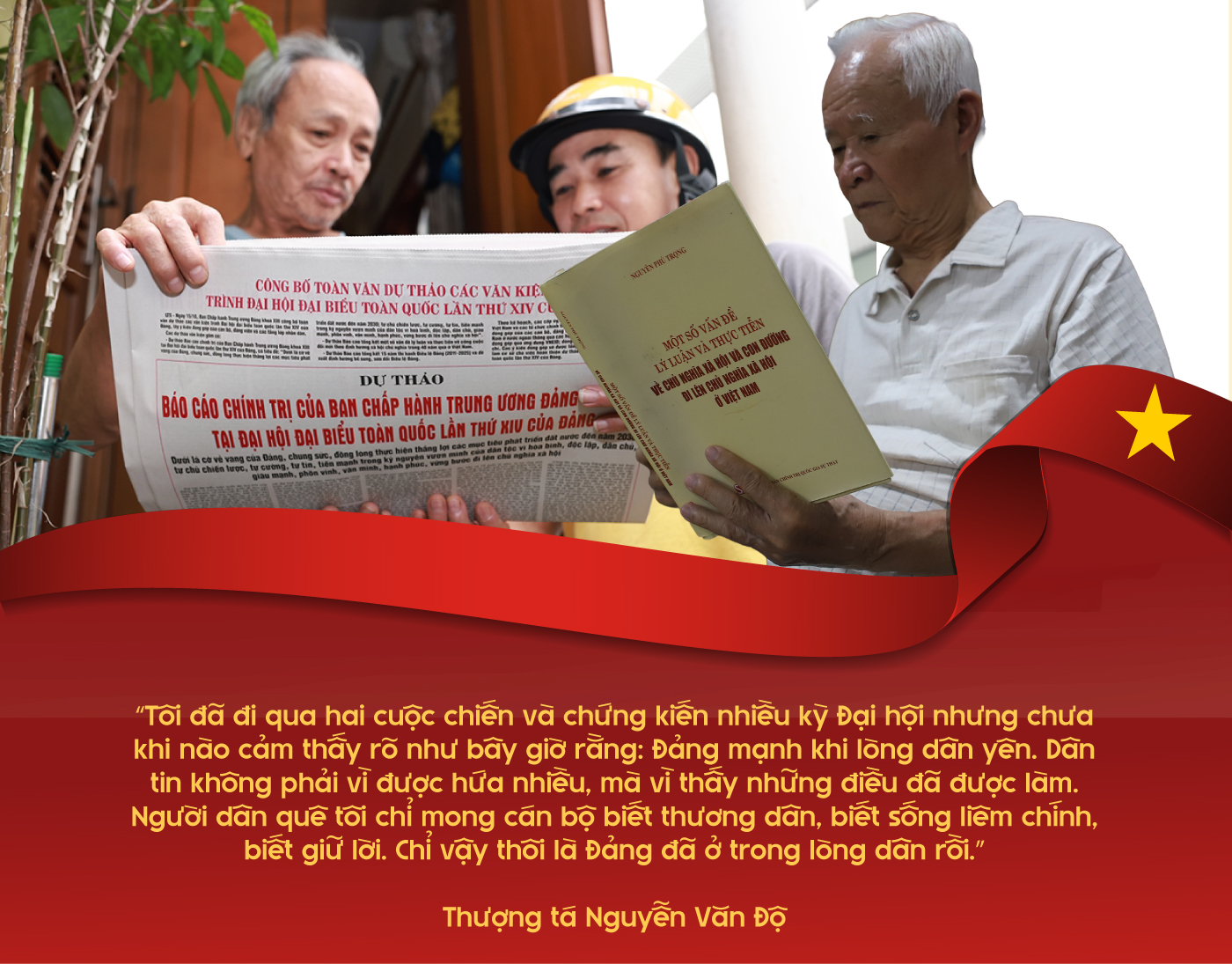



![[Photo] Da Nang: Water gradually recedes, local authorities take advantage of the cleanup](https://vphoto.vietnam.vn/thumb/1200x675/vietnam/resource/IMAGE/2025/10/31/1761897188943_ndo_tr_2-jpg.webp)
![[Photo] Prime Minister Pham Minh Chinh attends the 5th National Press Awards Ceremony on preventing and combating corruption, waste and negativity](https://vphoto.vietnam.vn/thumb/1200x675/vietnam/resource/IMAGE/2025/10/31/1761881588160_dsc-8359-jpg.webp)


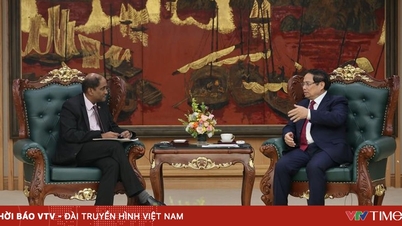
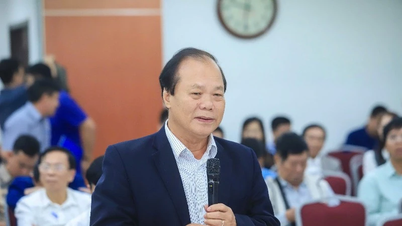

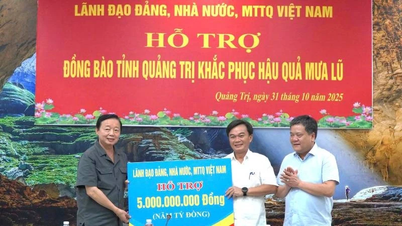
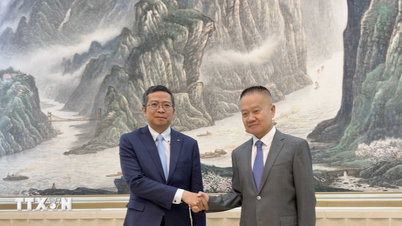


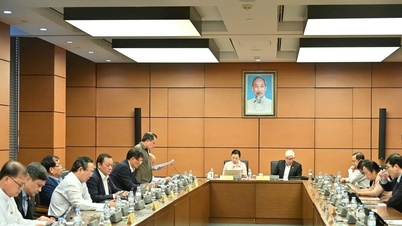





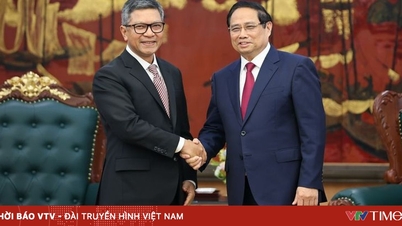

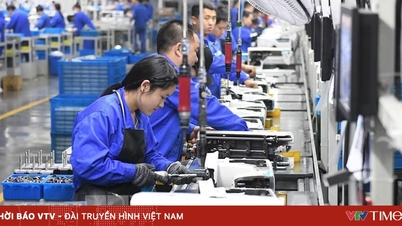

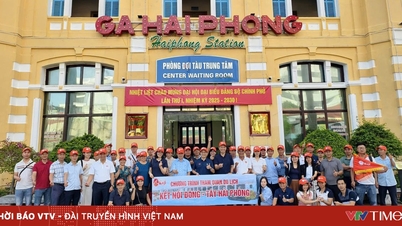


































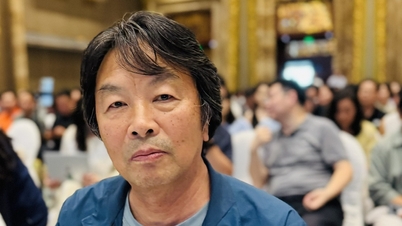

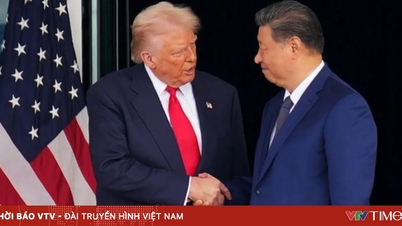

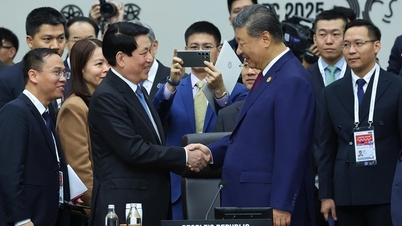

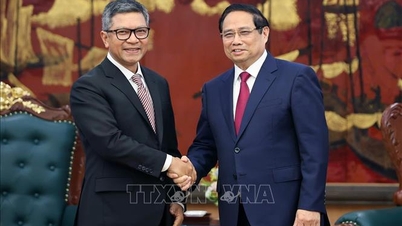
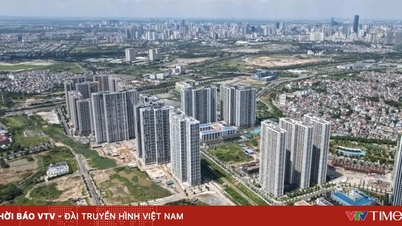





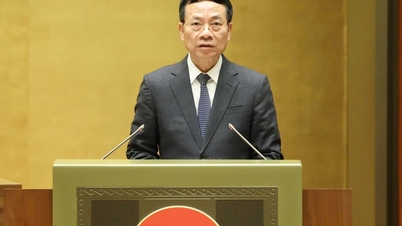

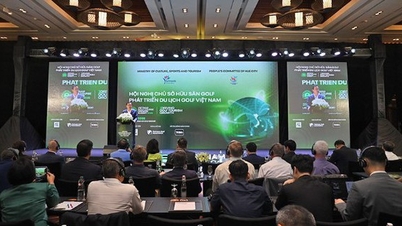
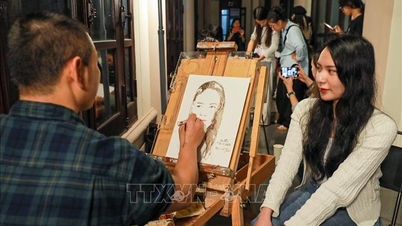




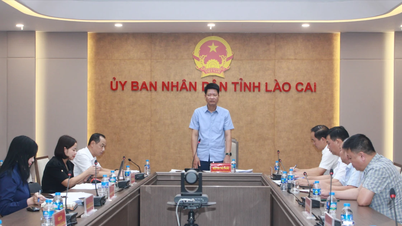

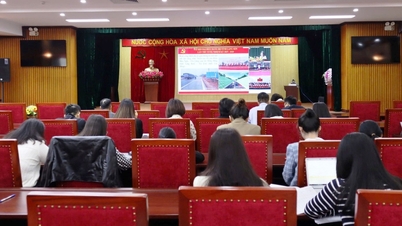












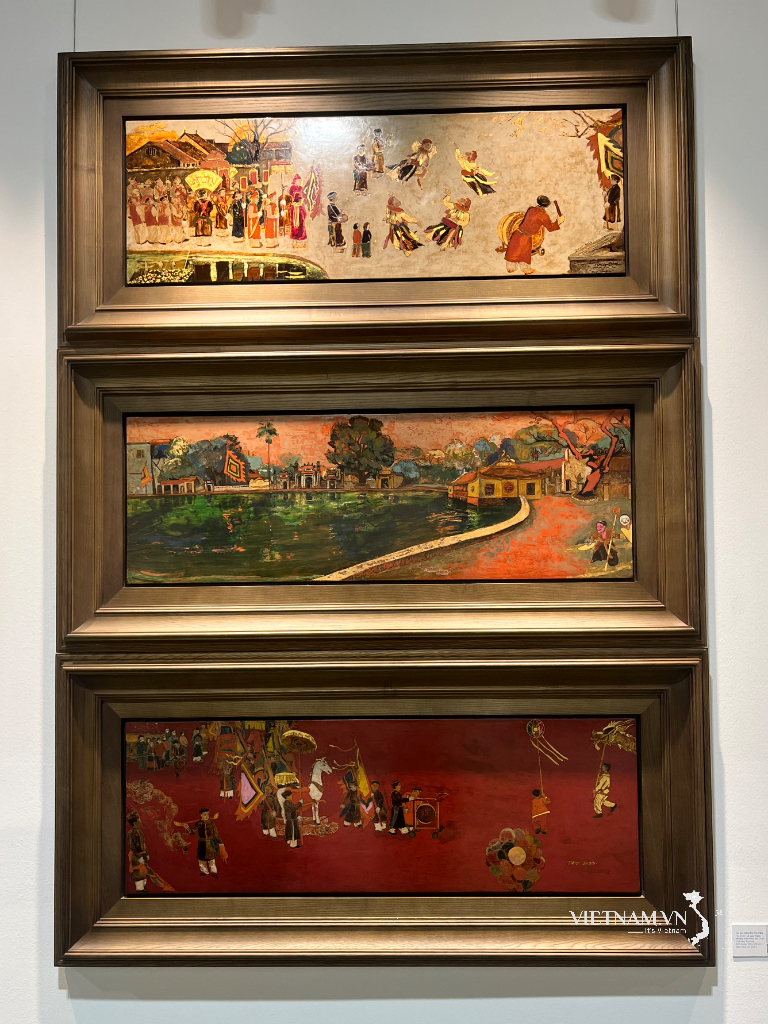



Comment (0)